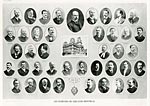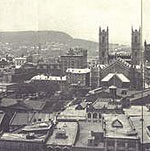

Establishment of the Board of commissioners
Reformists set out to control municipal management and costs related to the rapid growth of services by setting up an agency made up of a limited number of elected officials. Together with the Citizens Committee, reformists launched an offensive in 1908 in order to bring about a thorough reform of municipal institutions, and exerted great pressure on the provincial government. In 1909, a major public inquiry on the city administration was held at the instigation of the Committee. The Honorable Lawrence John Cannon filed his report in December 1909. His verdict was clear:
"The administration of the affairs of the city of Montreal by its council has, since 1892, been saturated with corruption arising especially from the patronage plague. The majority of the aldermen have administrated the committees and the council in such a manner as to favor the private interests of their relatives and friends, to whom contracts and positions were distributed to the detriment of the general interest of the city and of its taxpayers."1
During the course of that inquiry, the provincial government held a city-wide referendum and called on citizens to select a new form of government. In September, taxpayers voted for the establishment of Board of Commissioners. They were also in favor of reducing the number of aldermen. From then on, each district was represented by one councillor instead of two, as had been the case since the end of the nineteenth century. In February 1910, the reformists who had spearheaded that movement won four seats on the new Board of Commissioners.
The establishment of that board, first ancestor of the present executive committee, was a major turning point in the history of Montréal’s political institutions. The new form of government that was set up represented the first attempt at separating the executive powers that had been jealously exercised until then by city council. From then on, the executive and administrative functions were entrusted to the new institution, and the council maintained its powers in legislative fields. The Board thus inherited all the administrative powers that had formerly been exercised by aldermen committees.
Their victory, however, was short-lived since they proved unequal to the task of finding solutions to the city’s problems. Nothing was done to improve living conditions or solve the municipality’s underfinancing, even if Montréal had one of the lowest taxation rates in Canada at the time.
1 . Hon. Lawrence Cannon Report on Administration of City of Montréal, December 1909, pp. 73-74.





















